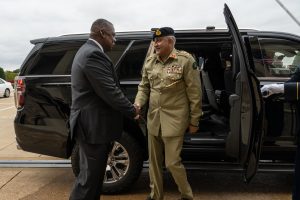Pakistan’s Chief of Army Staff (COAS) General Qamar Javed Bajwa will be retiring by the end of November after commanding the Army for six years. A career infantry officer belonging to the Baloch Regiment, Bajwa was chosen as Pakistan’s 16th Chief of Army Staff in 2016 by then-Prime Minister Nawaz Sharif. In 2019, then-Prime Minister Imran Khan gave Bajwa a three-year extension citing reasons related to the regional security environment.”
Bajwa has kicked off the “farewell visits” and put to rest fears of an 11th-hour surprise decision to hold on to his post. Many Pakistanis are praising him for sticking to the retirement plan, instead of seeking another extension.
Pakistan’s internal security improved significantly under Bajwa. His vision for a peaceful country was pitched in the form of the “Bajwa Doctrine,” which envisioned a stable Pakistan at peace with its neighbors.
During his term, the Pakistan Army launched Operation Radd-ul-Fasaad in February 2017 to not only clear the tribal areas of militant sanctuaries but also eliminate terrorist sleeper cells across the country. One of the major successes of the operation was the fencing of the Afghan border. It is because of the completion of the fencing project that Pakistan has been able to suppress the tide of militant attacks from Afghanistan after the withdrawal of international troops from the country last year.
Under Bajwa, Pakistan took firm action against militant groups that undermined Islamabad’s diplomacy and mediation with the neighboring countries. The action led to Pakistan’s removal from the Financial Action Task Force (FATF)’s grey list. Moreover, it also opened space for India and Pakistan to strictly observe the ceasefire agreement along the Line of Control (LoC) and other parts of the international border. The renewal of the ceasefire agreement has often been described in Pakistan as “General Bajwa’s Musharraf moment,” which almost resolved the Kashmir issue between India and Pakistan.
The ceasefire is evidence that if India and Pakistan summon the will, lasting peace can be achieved. The incoming army chief should draw strength from Bajwa’s idea of “bury the past and move forward” regarding ties with India despite all the challenges.
Bajwa should also be credited for launching the public version of the country’s first-ever National Security Policy, which positions geoeconomics as a major part of the country’s national security framework. The military’s increasing focus on stabilizing the economy demonstrates that the institution realizes that comprehensive sovereignty and security cannot be achieved in the absence of economic stability.
It is important to note here that under Bajwa, the military has voluntarily taken budget cuts in its development program and curtailed other defense spending. It is expected that this vision vis-à-vis rationalizing military expenditure at a time when Pakistan is in the grip of an economic crisis will continue, allowing space for other steps to be taken for the improvement of the economy.
It was the military under Bajwa that carried out Pakistan’s international diplomacy for years. From making back-channel efforts to save Pakistan from economic default by facilitating efforts of the governments of the time to secure much-needed financial assistance from international lenders to obtaining loan rollovers from China and Saudi Arabia, Bajwa has done it all. Moreover, he has been instrumental in putting Pakistan’s relationships with countries like the United States back on track. Under Bajwa, Pakistan’s relations with China deepened with projects such as the China-Pakistan Economic Corridor (CPEC).
On the issue of civil-military relations, there were some frictions. Yet Bajwa will always be remembered as a pro-democracy general, who not only allowed space for democratic forces in the country but also made extraordinary efforts to restrict the military’s role to that mandated by the constitution.
In recent months, Bajwa has been the target of much criticism from the Pakistan Tehreek-e-Insaf (PTI) for merely keeping his institution out of politics. As recently revealed by the Director-General of the Inter-Services Intelligence (ISI), Lieutenant General Nadeem Ahmed Anjum, former premier Imran Khan offered Bajwa an extension in his term in March 2022 “for an indefinite period” if he helped foil the opposition’s no-confidence motion against him. The DG ISI also stressed that those who will be leading the army in the coming 15 to 20 years believe that the institution should restrict itself to its constitutional role and stay out of politics.
It seems that the military under Bajwa has finally acknowledged that it cannot afford to intervene every time to resolve political problems. The sort of restraint the military has shown in the face of attacks by politicians and fabricated media campaigns in the last few months is commendable and perhaps could not have happened in the past. Amidst all this, we have seen free and fair elections and the army’s insistence that politicians should go back to Parliament to sort out their issues.
“It is the duty of everyone to strengthen democracy and the strength of our democracy are our national institutions. Whether it’s the parliament, the Supreme Court or the armed forces, Pakistan will progress with democracy,” Director-General of the Inter-Services Public Relations (ISPR) Major General Babar Iftikhar recently said.
In a nutshell, Bajwa’s tenure shows that it is time that political leaders rise to the occasion, as the country cannot be expected to be run by the military alone.
Moreover, the current chief has also cemented the idea that the military alone should not have to bear the responsibility of stabilizing Pakistan. Other institutions, including Parliament, should step up as well. Pakistan has monumental problems and expecting one institution to solve them all will only lead to other crises. This is what Bajwa has perhaps been able to successfully convey to his own institution. This is what his legacy will be in the years to come.

































